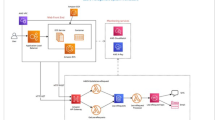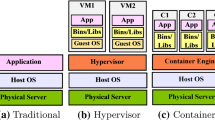Abstract
Operating system jitter is one of the causes of runtime overhead in high-performance computing applications. Many high-performance computing applications perform burst accesses to I/O, and such accesses consume a large amount of memory. When the Linux kernel runs out of memory, it awakens special kernel threads to reclaim memory pages. If the kernel threads are frequently awakened, application performance is degraded because of the threads’ resource consumption as well as the increase in the application’s page faults and migration between CPU cores. In this study, we empirically analyze the impact of jitter caused by reclaiming memory pages, and we propose a method for reducing it. The proposed method reclaims memory pages in advance of the kernel thread. It reclaims more pages at one time than the kernel threads, thus reducing the frequency of page reclaim and the impact of jitter. We conducted experiments using practical weather forecast software, the results of which showed that the proposed method minimized performance degradation caused by jitter.









Similar content being viewed by others
References
Akkan H, Lang M, Liebrock LM (2012) Stepping towards noiseless Linux environment. In: Proceedings of the 2nd international workshop on runtime and operating systems for supercomputers
Argonne Leadership Computing Facility: Mira/Cetus/Vesta. http://www.alcf.anl.gov/user-guides/mira-cetus-vesta. Accessed 20 Mar 2016
Beckman P, Iskra K, Yoshii K, Coghlan S (2006) The influence of operating systems on the performance of collective operations at extreme scale. In: Proceedings of the 2006 IEEE international conference on cluster computing
Betti E, Cesati M, Gioiosa R, Piermaria F (2009) A global operating system for HPC clusters. In: Proceedings of the 2009 IEEE international conference on cluster computing
Chinner D, Higdon J (2006) Exploring high bandwidth filesystems on large systems. Proc Ott Linux Symp 2006:177–191
De P, Kothari R, Mann V (2007) Identifying sources of operating system jitter through fine-grained kernel instrumentation. In: Proceedings of the 2007 IEEE international conference on cluster computing, pp 331–340
De P, Mann V, Mittaly U (2009) Handling OS jitter on multicore multithreaded systems. In: Proceedings of the 23rd IEEE international symposium on parallel and distributed processing
Dunigan TH (1994) Early experiences and performance of the Intel Paragon. Tech. Rep. ORNL/TM-12194, Oak Ridge National Laboratory
Ferreira KB, Bridges P, Brightwell R (2008) Characterizing application sensitivity to os interference using kernel-level noise injection. In: Proceedings of the 2008 ACM/IEEE conference on supercomputing
Giampapa M, Gooding T, Inglett T, Wisniewski RW (2010) Experiences with a lightweight supercomputer kernel: lessons learned from Blue Gene’s CNK. In: Proceedings of SC10
Gioiosa R, Petrini F, Davis K, Lebaillif-Delamare F (2004) Analysis of system overhead on parallel computers. In: Proceedings of the 4th IEEE international symposium on signal processing and information technology, pp 387–390
GlusterFS. http://www.gluster.org/. Accessed 20 Mar 2016
Hoefler T, Schneider T, Lumsdaine A (2010) Characterizing the influence of system noise on large-scale applications by simulation. In: Proceedings of SC10
Isaila F, Balaprakash P, Wild SM, Kimpe D, Latham R, Ross R, Hovland P (2015) Collective I/O tuning using analytical and machine learning models. In: Proceedings of the 2015 IEEE international conference on cluster computing, pp 128–137
Jones T (2011) Linux kernel co-scheduling for bulk synchronous parallel applications. In: Proceedings of the 1st international workshop on runtime and operating systems for supercomputers, pp 57–64
Kuo CS, Shah A, Nomura A, Matsuoka S, Wolf F (2014) How file access patterns influence interference among cluster applications. In: Proceedings of 2014 IEEE international conference on cluster computing, pp 185–193
Morari A, Gioiosa R, Wisniewski RW, Cazorla FJ, Valero M (2011) A quantitative analysis of OS noise. In: Proceedings of the 2011 IEEE international parallel and distributed processing symposium, pp 852–863
Moriya S (2011) Tunable watermark. https://lwn.net/Articles/422291/. Accessed 20 Mar 2016
Nataraj A, Morris A, Malony AD, Sottile M, Beckman P (2007) The ghost in the machine: observing the effects of kernel operation on parallel application performance. In: Proceedings of SC07
Oral S, Wang F, Shipman GM, Dillow D, Miller R, Maxwell D, Becklehimer J, Larkin J, Henseler D (2010) Reducing application runtime variability on Jaguar XT5. Cray User Group (CUG) Meeting
Oyama Y, Ishiguro S, Murakami J, Sasaki S, Matsumiya R, Tatebe O (2014) Reduction of operating system jitter caused by page reclaim. In: Proceedings of the 4th international workshop on runtime and operating systems for supercomputers (ROSS’14)
Park Y, Hensbergen EV, Hillenbrand M, Inglett T, Rosenburg B, Ryu KD, Wisniewski RW (2012) FusedOS: fusing LWK performance with FWK functionality in a heterogeneous environment. In: Proceedings of the 24th international symposium on computer architecture and high performance computing, pp 211–218
Rosenthal E, León EA, Moody AT (2013) Mitigating system noise with simultaneous multi-threading. In: Proceedings of SC13, poster session
Schwan P (2003) Lustre: building a file system for 1000-node clusters. In: Proceedings of the 2003 Linux symposium
Seelam S, Fong L, Lewars J, Divirgilio J, Veale BF, Gildea K (2011) Characterization of system services and their performance impact in multi-core nodes. In: Proceedings of the 25th IEEE international parallel and distributed processing symposium, pp 104–117
Shvachko K, Kuang H, Radia S, Chansler R (2010) The Hadoop distributed file system. In: Proceedings of the 26th IEEE symposium on massive storage systems and technologies
Sumimoto S (2013) Performance evaluation of FEFS on K computer and Fujitsu’s roadmap toward Lustre 2.x. Lustre User Group 2013. http://www.opensfs.org/events/lug13/. Accessed 20 Mar 2016
Tatebe O, Hiraga K, Soda N (2010) Gfarm grid file system. New Gener Comput 28(3):257–275
Tsafrir D, Etsion Y, Feitelson DG, Kirkpatrick S (2005) System noise, OS clock ticks, and fine-grained parallel applications. In: Proceedings of the 19th ACM international conference on supercomputing, pp 303–312
van Riel R (2011) Add extra free kbytes tunable. https://lkml.org/lkml/2011/9/1/188. Accessed 20 Mar 2016
Vicente E Jr, Matias R (2012) Exploratory study on the Linux OS jitter. In: Proceedings of the 2012 Brazilian symposium on computing system engineering, pp 19–24
WRF. http://www.wrf-model.org/. Accessed 20 Mar 2016
Yuan Q, Zhao J, Chen M, Sun N (2010) GenerOS: an asymmetric operating system kernel for multi-core systems. In: Proceedings of the 24th IEEE international parallel and distributed processing symposium
Acknowledgments
We are grateful for the insightful discussion with Hiroko Midorikawa of Seikei University. We also appreciate many insightful feedbacks from anonymous reviewers.
Author information
Authors and Affiliations
Corresponding author
Additional information
This research was supported by CREST, JST.
This paper is an extended version of the paper titled “Reduction of Operating System Jitter Caused by Page Reclaim,” which has appeared in the Proceedings of the 4th International Workshop on Runtime and Operating Systems for Supercomputers (ROSS 2014) [21].
Rights and permissions
About this article
Cite this article
Oyama, Y., Ishiguro, S., Murakami, J. et al. Experimental analysis of operating system jitter caused by page reclaim. J Supercomput 72, 1946–1972 (2016). https://doi.org/10.1007/s11227-016-1703-1
Published:
Issue Date:
DOI: https://doi.org/10.1007/s11227-016-1703-1




